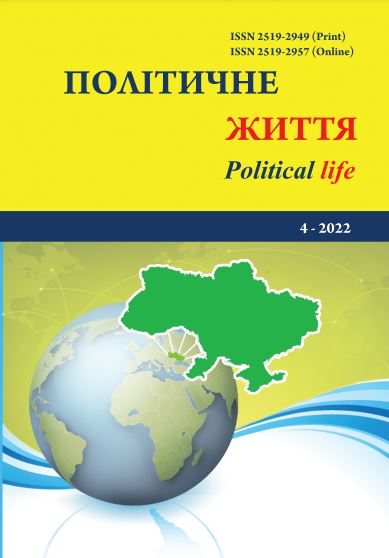Bots in social media: realities and prospects for the election campaigns in Ukraine
DOI:
https://doi.org/10.31558/2519-2949.2022.4.11Keywords:
social media; bots; agitation; Facebook; Instagram; Twitter; Telegram; YouTubeAbstract
The use of social media is an important component of political campaigning. But at the same time, it can be a source of some risks, such as bots’ functioning. The article demonstrates that the latter poses significant problems for the Ukrainian political sphere. Since bots are most often used to spread disinformation (or fakes), distort public opinion, create the illusion of massive voter support for certain political forces (or their representatives), make it difficult for political competitors to communicate with supporters, etc. The article covers some examples of this phenomenon in pre-election campaigns, both in parliamentary and local elections in Ukraine. This is an additional confirmation of the prevalence of bots at various levels of competition between political forces for election victory. It has been determined that the joint work of the governments of countries, intergovernmental bodies, companies that own social media, and relevant scientists are necessary to find an effective solution to the problem of this destructive influence. The most common signs of bots were also outlined (the presence of a fake photo in the account; the absence of personal information, a valid name, friends (or a small number of them – in case this information is made public); anomalous activity manifested in the distribution of other people’s content, publication of the same type content (texts, photos, videos, graphics or drawings, etc.), and prospects for use in future election campaigns. Social media users’ behavior is also analyzed in the article.
Another direction in the development and use of bots, which does not foresee negative consequences, but on the contrary allows optimizing and structuring work, speeding up communication with voters, exercising more effective control over compliance with election legislation, and quickly reducing the scale of violations is highlighted in the article. Examples of their application by some political parties in the elections to the Verkhovna Rada of Ukraine are included.
References
Бібліотека реклами. (2019). Facebook. URL: https://www.facebook.com/ads/library/?active_status=all&ad_type=political_and_issue_ads&country=UA
(Access date: 01.11.22).
Бунєєва К.Т. Фейк в контексті комунікативних практик. Гуманітарний корпус: [збірник наукових статей з актуальних проблем філософії, культурології, психології, педагогіки та історії]. Випуск 43. Вінниця: ТОВ «ТВОРИ», 2022. – С. 39-42.
Герасименко В. Твіттер-боти Медведчука та інших. Texty.org.ua. URL: https://texty.org.ua/d/2018/twitter/ (Access date: 01.11.22).
Єгошина В., Толстякова К. «Ілюзіоністи». Як боти «Нарфронту» спотворювали громадську думку. Радіо Свобода. URL: https://www.radiosvoboda.org/a/schemes/29744533.html (Access date: 01.11.22).
Ковальова Д. 15 гривень за коментар. Як працюють бот-ферми в Україні і хто з політиків користується їх послугами – відео. Nv.ua. URL: https://nv.ua/ukr/ukraine/politics/bot-ferma-hto-z-politikiv-koristuyetsya-poslugami-botiv-video-novini-ukrajini- 50043675.html (Access date: 01.11.22).
Молодецька-Гринчук К.В. Соціальні боти як інструмент деструктивного інформаційного впливу на акторів соціальних інтернет-сервісів. Збірник наукових трудів конференції: «Сучасні інноваційні технології підготовки інженерних кадрів для гірничої промисловості і транспорту 2017». Дніпро, 2017. – С. 442-447.
Отт М., Лозовий В. Зітри це, якщо зможеш. Як живуть українські боти на сторінках українських політиків. Вокс Україна. URL: https://voxukraine.org/uk/zitri-tse-yakshho-zmozhesh-yak-zhivut-ukrayinski-boti-na-storinkah-ukrayinskih-poli tikiv/ (Access date: 01.11.22).
Про порушення агітації можна інформувати за допомогою телеграм-бота. Політична партія «Голос». URL: https://goloszmin.org/news/pro-porushennya-agitaciyi-mozhna-informuvati-za-dopomogoyu-telegram-bota (Access date: 01.11.22).
Радіо М. Переваги та загрози використання ботів у соціальних медіа (приклад парламентської кампанії 2019 р.). Проблеми та перспективи розвитку сучасної науки: збірник тез доповідей Міжнародної науково-практичної конференції молодих науковців, аспірантів і здобувачів вищої освіти. Ч. 2. Рівне : НУВГП, 2020. С. 274-276.
Радіо М. Практика застосування соціальних медіа кандидатами на посаду міського голови Рівного (вибори 2020 р.). Політичні партії і вибори: українські та світові практики: зб. ст. і тез за результатами п’ятої міжнародної наукової конференції «Політичні партії і вибори: українські та світові практики» (пам’яті Юрія Романовича Шведи) від 28 листопада 2020 року. Львів: Львівський національний університет імені Івана Франка, 2021. Вип. 5. С. 79-86.
Слуга Народу! Бот. Telegram. URL: https://t.me/SlugaNaroduHelpBot (Access date: 29.03.2020).
Указ Президента України №133/2017 «Про рішення Ради національної безпеки і оборони України від 28 квітня 2017 року «Про застосування персональних спеціальних економічних та інших обмежувальних заходів (санкцій)». Офіційне інтернет-представництво Президента України. URL: https://www.president.gov.ua/documents/1332017-21850 (Access date: 01.11.22).
Указ Президента України №184/2020 «Про рішення Ради національної безпеки і оборони України від 14 травня 2020 року «Про застосування, скасування і внесення змін до персональних спеціальних економічних та інших обмежувальних заходів (санкцій)». Офіційне інтернет-представництво Президента України. URL: https://www.president.gov.ua/documents/1842020-33629 (Access date: 01.11.22).
Шиповський В. В. «Ботоферми» як ефективний медіаманіпулятивний інструмент в соціальних мережах. Сучасні інформаційні технології та системи в управлінні : зб. матеріалів ІІ Міжнар. наук.-практ. конф. молодих вчених, аспірантів і студентів, (Інтернет-конф.). Київ : КНЕУ, 2020. С. 55–59.
Alba D. Facebook sent flawed data to misinformation researchers. – New York Times.
to-mi sinformation-researchers (Access date: 01.11.22).
Fernquist J., Kaati L. and others. Twitter Bots and the Swedish Election. Open Source Intelligence and Cyber Crime. Lecture Notes in Social Networks. Springer, Cham. https://doi.org/10.1007/978-3-030-41251-7_6
Gleicher N. Coordinated Inauthentic Behavior Explained. FACEBOOK.
URL: https://about.fb.com/news/2018/12/inside-feed-coordinated-inauthentic-behavior/ (Access date: 01.11.22).
Gleicher N. Removing Coordinated Inauthentic Behavior From Iraq and Ukraine. FACEBOOK.
URL: https://about.fb.com/news/2019/09/removing-coordinated-inauthentic-behavior-from-iraq-and-ukraine/
(Access date: 01.11.22).
The State of Influence Operations 2017 – 2020. FACEBOOK. 2021. 44 p.
URL: https://about.fb.com/wp-content/uploads/2021/05/IO-Threat-Report-May-20-2021.pdf
(Access date: 01.11.22).

